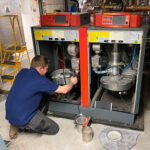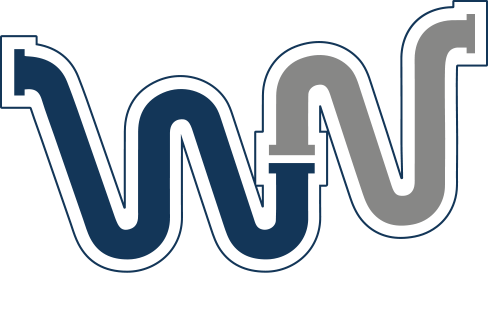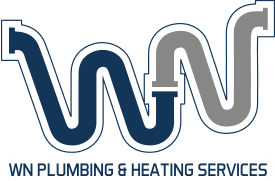Gas Testing and Purging
YOU'RE IN SAFE HANDS
Gas Testing and Purging
WN Plumbing are experienced commercial and industrial Gas Safe registered installers and can provide tightness testing, purging gas pipework, commissioning and de-commissioning of gas pipework for IGEM/UP/1 and IGEM/UP/1A
Upon completion, we will provide you with certification to confirm an effective gas purge/tightness test/commission/decommission has been carried out and that your system is safe.
Our commercial gas engineers are fully conversant with The Gas Safety (Installation & Use) Regulations 1998, enabling them to give advice on ensuring your installation is gas safe compliant.
Why is a purge required?
Whenever gas pipework is repaired, extended or newly installed, a purge must be conducted.
Gas Purging Equipment
We hold multiple purge stacks consisting of gas meters and flame arrestors. We also have a Gascoseeker (a commercial analyser) for sampling the gas within the pipework.
All our equipment is fully calibrated to ensure accurate readings are produced.
Arranging a commercial gas pipework purge
A full survey will be provided prior to the commencement of the gas purging, with a full risk assessment and method process plan being conducted to ensure the purging is undertaken to the highest safety standards.
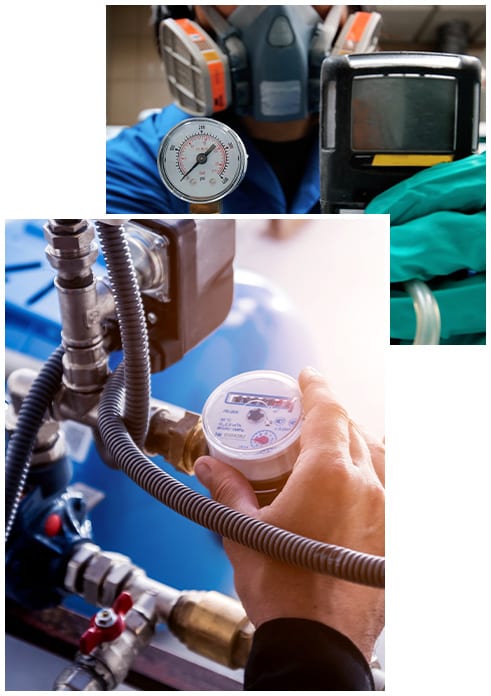
Call us today at 020 7100 3981
or email us at info@wnplumbing.co.uk
Emergency 24-Hour Services for Plumbing, Heating and Drainage
The people who have trusted us so far
What is a commercial boiler
From hospitals and schools to offices and apartment buildings, various buildings rely on commercial boilers. But what are these appliances, and how are they different from household boilers? Read on for the answers to these questions and tips on how to choose the right commercial boiler for your organization.
Commercial boilers explained
Commercial boilers are systems that provide heating and hot water for non-residential buildings. Typically, these devices are pressurized systems that can burn fuel or use electricity to produce hot water or steam. Then, the hot water or steam circulates around the building through the pipe system and can be used as needed to create a comfortable environment. These systems usually use natural gas as fuel, but they can also burn fuel or use resistance coils to generate heat.
When does a boiler become commercial?
If you’re wondering, when does a domestic boiler become commercial, the answer largely depends on the size. Boiler size, or output, is measured in kilowatts (kW). Unsurprisingly, domestic boilers tend to have smaller output than commercial appliances. In many cases, domestic boilers range in size from 24kW to 42kW, although they can be up to 70kW.
In general, appliances larger than this are classed as commercial boilers. These systems are suitable for more sizable premises, whether that’s an office, leisure center, health center, college, warehouse, factory, or any other type of non-domestic building. Gas and oil-fired commercial boilers are often in the 250kW to 1,500kW range. This huge spread of output sizes helps to ensure that organisations are able to find appliances that meet their specific heating and hot water needs.
The sizing cut-offs between domestic and commercial boilers aren’t quite this straightforward, however. Certain commercial boilers have an output of less than 70kW. For example, it is possible to get portable commercial electric boilers ranging from 15kW to 36kW. These compact appliances are a popular choice on construction sites, for example as an aid in the screed drying process. They can also be used in shops, garages, sports halls, and a variety of other settings.
How to choose the right commercial boiler for your premises
With so many different types of commercial boilers to choose from, deciding which boiler to choose for your organization can be confusing. When choosing one of these devices, you should consider various issues. Here are some of the most important:
Size
As mentioned previously, commercial boilers differ hugely in terms of size. So, when you’re considering your options, it’s important to have a clear understanding of the heating and hot water requirements of your premises. For example, how large is your building, how many radiators do you need to heat, and how many hot water outlets do you have? Getting a boiler with an appropriate output is critical.
Don’t worry if you’re unsure about your specific heating and hot water needs. You can arrange for an expert to come to your premises and carry out a site survey to ensure you select a boiler that matches your technical requirements.
Energy efficiency
Heating and hot water might represent a significant ongoing cost for your organisation, so it pays to think carefully about energy efficiency when you’re looking for a commercial boiler. The good news is, there’s no shortage of highly efficient appliances to choose from. Just make sure that you look carefully into the efficiency information of different boilers before you make a final decision.
Getting a boiler that’s the right size also plays a big role here. You obviously need an appliance capable of meeting your heating and hot water needs, but you don’t want a system with too much redundant capacity as this could mean you end up paying more in fuel costs than you need to.
Support and maintenance
You no doubt want a heating and hot water system that you can rely on around the clock, and this means having a good maintenance and support agreement in place with the boiler supplier. So, when choosing an appliance, check the supplier’s maintenance, support, and service policies.
Our boilers come with unique BMS Trend technology, which enables us to monitor performance remotely. If we detect any issues, we can make minor adjustments without even needing to send an engineer to the site, saving you disruption and inconvenience.
Our top 3 high rated commercial boiler manufacturers:
Top on our list of best boiler brands is Ideal Commercial Boilers, a century-old, reputable British manufacturer that has grown exceptionally over the last decade. They now sell over 10,000 units per year and offer a variety of commercial boilers, including their latest model the Imax Xtra 2
which features:
- 5 year Heat Exchanger warranty
- Robust cast aluminium silicon alloy heat exchanger
- NOx <40mg/kWh (Class 6) on natural gas
- Full colour touchscreen
- Cascade header kits and controls
- Fitted with wheels for easy installation
- Capable of operating at up to 30°C ?T
- Up to 97.7% full load efficiency
- Up to 108.2% part load efficiency
- High 5:1 turndown
- Small footprint and fits through standard doorways
Ideal Commercial Boilers is the UK’s market leader in high-efficiency commercial heating solutions. Operating from the Hull manufacturing plant and offices since 1906, they are one of the few truly British manufacturers left in the heating industry.
Worcester Boilers
Number two on our list of boiler makers is certainly the most well-known — Worcester Bosch is considered by many to be one of the best boiler brands available.
Its diverse range of boilers is known for being well-built, reliable, efficient, and the long guarantees prove that the company has great faith in its boilers. Unlike traditional warranties, Worcester’s guarantee actually means that the manufacturer is 100% committed to repairing the device should it malfunction. It’s no wonder that Worcester Bosch is widely recognized as a leader in aftercare.
Note that the exact guarantee period depends on the boiler you choose and the other Worcester-branded products you use.
Bosch products deliver high levels of fuel efficiency, consistent heating, and hot water performance and have a notoriously long product life. The planning and provision of heating, hot water, and air-conditioning solutions will always present certain challenges, however, Bosch Commercial and Industrial can offer the complete system solution from a single source.
Viessmann Boilers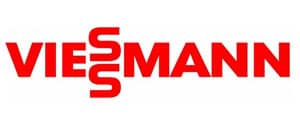
If you plan on bringing German engineering into your business, know that Viessmann are the largest boiler manufacturer in Europe; and no list of best boilers is complete without this brand.
Relied upon for their ruthless boiler efficiency and because they also tend to last longer than the competition, Viessmann boilers have snagged a Which Best Buy boilers award for being able to offer hot water and heating right when you need it.
Viessmann offers a range of boilers from Wall mounted to Floor standing gas boilers
The ideal boiler for every application
Vitocrossal gas condensing boilers boast a range of features including advanced condensing technology, convenient control units, exceptional efficiency, and low emissions.
Viessmann Vitocrossal boilers are designed with both current and future needs in mind and as a result not only comply with current environmental legislation but will continue to do so long into the future, even as emissions limits become stricter.
Advanced condensing technology
The stainless steel Inox-Crossal heat exchanger provides ideal conditions for utilising condensing technology. the smooth stainless steel heat exchanger allows the condensate created by the condensing process to simply run off downwards.
Combined with the smooth stainless steel surface, this creates a permanent self-cleaning effect, thus ensuring that the condensing technology is utilised at a permanently high level, resulting in a longer service life whilst also reducing the maintenance effort.
Commercial boiler systems must be carefully planned and precisely designed. The trade-off or random installation of all equipment and plumbing not only results in system inefficiencies but also creates serious health and safety risks. At WN Plumbing & Heating we take pride in designing commercial boiler systems that make the most of space, are robust and efficient, and deliver the best possible results without compromising safety.
Inside the Boiler Plant Room
Often referred to simply as a “boiler room,” a plant room can be as simple as a single gas or electric boiler and some plumbing, or as complex as an aircraft control panel. The boiler room is the nerve center of every business enterprise, regulating the smooth operation of the numerous circuits that supply everything from light bulbs to using electricity to complete outdoor heating. This may include some or all of the following:
- Air conditioning and thermostats
- Ventilation, air ducts, and filters
- Refrigeration units
- Water heaters, pumps, and storage tanks
- Sprinkler systems
- Electrical outlets and wiring
- Gas network
- Elevator controls and machinery
Depending on the type of business, a boiler room may also require specialized equipment and controls for specific industry projects, such as complex plumbing systems in bars and pubs, or precise controls in a pharmaceutical company’s cleanroom.
One Size Does NOT Fit All
There is no standard boiler system installation. Every trading company has different requirements and we at WN Plumbing & Heating know it very well. A small high-street store may only need a simple system, while a larger hotel may require a more sophisticated method of controlling all electrical, gas, and water power equipment. Some require a small room, while others require multiple rooms or entire floors to house the controller. Big, small, simple, or complex: WN Plumbing & Heating assesses the situation before installing the most suitable and efficient technical room.
Safety Always Comes First
There are various factors that must be considered when designing the ideal boiler room before bolting on the first piece of equipment or running the first plumbing. The health and safety of employees and visitors are paramount and required by law. Some of the items on the WN Plumbing & Heating checklist are:
- Correct ventilation
- Floor coverings must comply with legal requirements for slip resistance
- Noise reduction measures may be required to keep decibel levels below legal limits
- Safety devices and fire extinguishers must be easily accessible
- Emergency exit routes must be easy to follow and navigate
Commercial boiler rooms full of electrical equipment can create fires and dangerous workspaces if not properly planned and laid out in an orderly and safe manner. We take great care to ensure our designs make optimal and safe use of available space and do not compromise the safety of our clients or their employees.
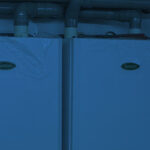
Are there significant differences between private and commercial plumbing? Well, we’ve all had plumbing problems at some point, and the vast majority believe that any plumber can fix all kinds of plumbing problems, no matter the location, whether it’s your home or office.
To a certain extent, it is reasonable to assume that there is no difference between commercial plumbing and residential plumbing, as both use the same type of material in performing their function.
WN Plumbing & Heating proved both Residential and Commercial Plumbing, Heating, and Gas Services.
How do we define commercial and residential premises
Commercial or industrial premises used to conduct trade. This can include offices, shops, restaurants, or any other type of business. Therefore, they are usually larger than residential buildings.
Residential and Commercial and their Unique Differences
While we would like to acknowledge the obvious similarities between the two, there are few differences a good plumbing contractor should understand and consider when it comes to any particular project, and these differences may include the following:
Size:
In most cases, the difference between commercial and residential plumbing comes down to size. For example, industrial facilities are often large and may require the use of more pipes and outlets than residential facilities. In other words, most companies must meet the needs of both employees and customers. This means toilets and other accessories will be in high demand compared to household plumbing
The extent of the problem
The same distinction is made between the various problems faced by residential and commercial facilities. While residential plumbing tends to experience variations of the same normal issues, commercial plumbing, on the other hand, is likely to face a variety of issues that are not regulated. Therefore, plumbers should be prepared for a variety of issues that are rarely addressed in residential environments.
Number of Levels (Floors)
Office buildings require multiple floors, all of which require sinks, toilets, and other stuff. Of course, gravity will play a big role in the work whistle. On the other hand, residential building installations typically require less than two to three layers of plumbing.
Choosing the right Commercial or Residential plumber for you
Now that we’ve identified the specific differences between commercial and residential plumbing, here are some key things to consider when choosing the right plumber for you. This may include the following:
How versatile is the plumber?
When choosing a plumbing contractor, it is important to ensure that the plumber you are considering is highly skilled in a variety of plumbing services. Make sure they are well equipped for system maintenance, installation, diagnostics, upgrades, and reviews.
Are they available for the times you require?
Make sure they can take care of you right away in a plumbing emergency.
Are their credentials and qualifications up to date?
Well, there is a clear difference between being on call without the necessary equipment, regulations, and requirements that commercial plumbers have to comply with. While residential plumbing may not require strict standards, it’s important to make sure your plumber is on-trend.
We are here to help you! Visit our emergency plumbers page for more details about these services and for all your plumbing needs.
6 Ways To Make Sure Your Commercial Boiler Works All Winter
Having your commercial boiler breakdown during the winter months is every business’s worst nightmare. Getting it up and running again can be costly and time-consuming, and trying to run a business without heat and hot water is inconvenient and bad for the morale of staff, not to mention customers. As the old saying goes, an ounce of prevention is better than a pound of cure, so putting the effort in to prevent a breakdown in the first place is much better than neglecting your boiler and having to fix it when it goes wrong.
Here are seven simple steps you can take all year round to make sure your boiler is in tip-top shape to tackle even the coldest of winters.
1. Insulate or heat water pipes
One of the most common problems with commercial boilers is the pipes freezing when cold weather hits, just like the ones in your home can. Frozen pipes are expensive to repair and can even burst, which can lead to water flooding your commercial property, causing even more damage and expense. This is a particular risk if you have condensate pipes that run outside of your building. Pipe insulation comes in many forms and is generally quick, easy and inexpensive to fit.
2. Turn the heating on during the summer
If you only use your boiler for heating you should turn it on for 15 minutes every few days during the summer months. This keeps the boiler working smoothly and prevents it from seizing up or developing issues that could be problematic when the weather turns colder. It also allows you to identify any problems and have them fixed before you come to turn the heating on when you really need it.
3. Bleed radiators on a regular basis
Radiators that are cold at the bottom but warm at the top have air trapped in them. The air needs to be released or you could end up with bigger problems on your hands. Once it has been released the heat within the radiator will be more evenly distributed, which will heat your space more efficiently and save you money in the long run. Most radiators are easy to bleed and there are plenty of online tutorials available to show you how to do it.
4. Keep an eye on the boiler pressure
Loss of pressure within your boiler is a fairly common occurrence and usually happens due to either a small leak in the system or bleeding your radiators. If your boiler loses too much pressure, your system will run efficiently or stop working altogether. Pressure problems are easy to diagnose by keeping an eye on the pressure gauge that will usually be visible on the front of your boiler system. In some cases it can be relatively easy to re-pressurise it yourself, so check your boiler manual for instructions. However, if you are in any way unsure about what you’re doing, call in an engineer to do it for you.
5. General housekeeping
Boilers are often located in out-of-the-way areas that end up being used for storage. Ventilation is crucial for the efficient operation of a boiler, so make sure the area around it is free from clutter and ensure it can be easily accessed at all times. This is also important for external vents: check regularly to make sure they haven’t been accidentally covered up or blocked by debris such as leaf litter or rubbish.
General housekeeping should also include doing a regular visual check on your boiler for obvious warning signs that something is wrong. Look out for cracks, leaks, drips, strange noises and black soot marks. You should also dust the exterior of your boiler every now and then: preventing dust from settling prevents its tubes and pipes from getting clogged up, which can stop it from performing efficiently and cause higher heating bills. Never attempt to clean the inside of your boiler – this must be done by a registered professional.
6. Have your boiler serviced
Even if your boiler seems to be in good condition you should have it serviced at least once a year. It will give you the peace of mind of knowing that everything is in good working order, and be able to pick up potential problems before they become worse. A boiler service is usually performed during the autumn and ensures the boiler is cleaned, inspected and running properly, ready to take on the strains of keeping your commercial property heated throughout the winter.
Having your commercial boiler breakdown during the working day is not only stressful and inconvenient but could cost you thousands of pounds in lost work hours and revenue if you have to shut your business down for a period of time. Insulating pipes, keeping an eye on your boiler, performing regular housekeeping tasks and having your boiler serviced every year will prevent problems from happening, or enable you to act quickly to rectify them when they do occur. Putting in a small amount of effort on a regular basis will ensure you don’t end up in a big crisis at the worst possible time, and will ensure that your commercial boiler works smoothly and efficiently all winter.
If you need commercial boiler maintenance or are looking to install a new system altogether, then give us a call today and we’ll run through what’s involved.
Emergency 24-Hour Services for Plumbing, Heating and Drainage
